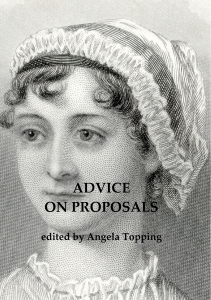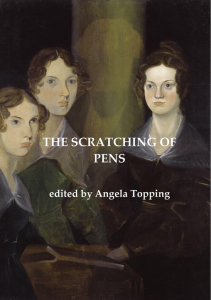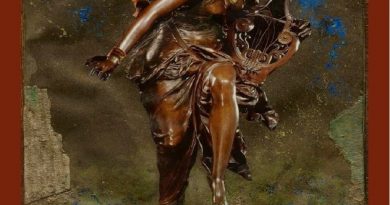The Austen/ Brontë/ Shakespeare Project ed. by Angela Topping
-Reviewed by Dave Coates–
Angela Topping has edited three anthology-pamphlets, Advice on Proposals, The Scratching of Pens and Sweet Breast and Acid Tongue, collections of poems based on the work of Austen, the Brontës and Shakespeare respectively, with contributions from Anne Stevenson, U.A. Fanthorpe, Luke Kennard and Markie Burnhope, to name a few. Topping has done great work prompting and assembling the variety of poets on display here, and the pamphlets themselves are satisfyingly solid, elegant objects.
Each collection is an interesting little cross-section of how poets engage creatively with each writer’s oeuvre; for the Brontës, Wuthering Heights and Jane Eyre loom large, for Austen, Mansfield Park and Pride and Prejudice (including P&P fatigue), while Shakespeare enjoys a slightly broader range focusing on Hamlet, Macbeth and the drowned books of The Tempest. Perhaps more to the point is the manner in which these poems address their literary prompts; Austen seems to provoke poems about romantic negotiations (fraught and otherwise) while the Brontës collect several on the flourishing tat empires of Howarth. Where Shakespeare’s texts and characters stand up for critical examination as entities with ingrained meaning, the other collections (albeit fruitfully) engage with the domesticated marketing of their genuinely revolutionary authors. This is not a reflection on the quality of individual poems (which on occasion completely buck the above trend), but an interesting snapshot of the functions each writer plays in the broader literary culture.
 In Advice on Proposals, Stevenson’s poem ‘Re-reading Jane’ is one such poem redressing Austeniana, and one of the best individual pieces in the pamphlet. The poem, and implicitly the misinterpretation of Austen, starts with her memorial in Winchester Cathedral; despite ‘the extraordinary endowments of her mind’, it still privileges the deeply un-Austenian qualities of ‘charity, devotion, faith and purity’ that might have ‘rendered her soul acceptable in the sight of her REDEEMER’ (caps in original text). Stevenson runs with this misrepresentation:
In Advice on Proposals, Stevenson’s poem ‘Re-reading Jane’ is one such poem redressing Austeniana, and one of the best individual pieces in the pamphlet. The poem, and implicitly the misinterpretation of Austen, starts with her memorial in Winchester Cathedral; despite ‘the extraordinary endowments of her mind’, it still privileges the deeply un-Austenian qualities of ‘charity, devotion, faith and purity’ that might have ‘rendered her soul acceptable in the sight of her REDEEMER’ (caps in original text). Stevenson runs with this misrepresentation:
‘To women in contemporary voice and dislocation
she is closely invisible, almost an annoyance.
Why do we turn to her sampler squares for solace?
Nothing she saw was free of snobbery or class.
Yet the needlework of those needle eyes…’
This clear-sightedness about a most clear-sighted writer is a valuable salve, and the line ‘Novels of manners? Hymeneal theology!’ a powerful statement for its playfulness. Elsewhere, Andy Jackon’s ‘Rorschach Test’ is worth mentioning for its careful unpicking of the deceptive complexity of Austen’s work explored at length by ‘Re-reading Jane’, and Kennard’s ‘Poem in which Mary Crawford is my Girlfriend’ is a clever and tender blend of literature and life.
I’m not as familiar with the Brontës’ work, and occasionally had the feeling of missing some key reference-points in The Scratching of Pens. Apologies to their composers. Happily, several pieces didn’t require (or outright supplied) this familiarity, such as Fanthorpe’s superb ‘E J B in Brussels’, which spins out Emily and Charlotte’s ambitions as brilliant minds circumscribed by social convention, in this case the disparity of education for women and men: ‘His scheme // Means servile imitation. I must divine my course.’ Fanthorpe balances Brontë’s admiration for the explorer William Parry with her relationship with Tabitha Ackroyd, the family’s housekeeper, ‘my curriculum / Her turns of phrase, her life, her work’. It’s not an entirely unpatronising statement, but recognises (for EJB at least) an alternative mode of understanding that is vital to her own writing. The poem’s closing lines: ‘I tell you this, / Who am the dark dissenter, the liberator, / Whose name is Thunder’ are satisfyingly dramatic.
The poets in Sweet Breast and Acid Tongue seem on surer literary ground, and accordingly find a number of unusual and creative entry-points to the Bard’s works. Jackson again pops up with ‘Three Elegies for Minor Shakespeare Characters’, a neat and generous piece that makes space for the perfunctory cogs of narrative, Fanthorpe again shows her empathetic power by restoring Titania’s dignity and agency by her genuine love for Bottom, ‘How I shook to the shuffle of your mortal heart’, while Valerie Law’s ‘On My Computer (After Sonnet 130)’ is an effective piece of textual re-wiring: ‘My computer’s screen is nothing like the sun / And yet it lights my way when all is dark.’
Maybe the stand-out piece is Burnhope’s ‘To My Parallel-Parked King, Richard III’, a sharp poem spinning personal meaning out of the source text. Here, Burnhope compares the slurs leveled at Richard, ‘Hedgehog, bottled spider, foul bunch- / Backed toad’ to those they have suffered, ‘planking skiver, / striver for nought but pity’. Both cases, the poem points out, are built on false assumptions; analysis of Richard’s skeleton found ‘your spinal scoliosis […] To be mild’, while Burnhope’s position as a ‘‘Difficult-to-place’ claimant’ has their ‘royally parked / By tourism, media, leader, law-maker’. The poem draws out Shakespeare’s occasionally wanton venom for his villains (the Acid Tongue of the collection’s title), and their inadequacy when applied to real persons. The truth, Burnhope asserts, is far more difficult, and Richard’s example of how easily a misconception can take hold when made from a position of authority.
The pamphlets are a well-executed project, and immediately set me thinking what other authors might benefit from another group of poets paying them similarly unsentimental attention.








Thanks for that detailed review. I am thinking about another set in a few years, so any suggestions gratefully considered. This set costs £15, or single pamphlets are £6, from Like This Press.